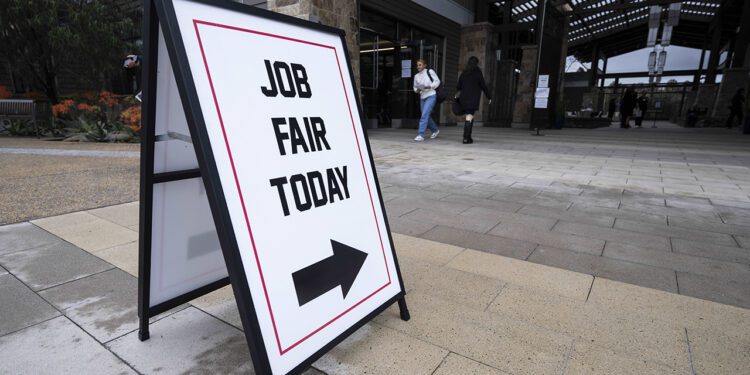Signs of pressure are emerging in the U.S. economy, leading to worries about a possible recession. The main factor igniting these concerns is the latest employment statistics. In July, only 114,000 new jobs were generated by U.S. employers, significantly below the anticipated 175,000 positions.
There are two reasons behind the decline in job growth and the uptick in unemployment for July… #Bidenomics & #Kamalanomics.
Republicans aim to create jobs, reduce costs for Americans, and strengthen the economy. https://t.co/7hDmRNpTqz
— Rep. Carol Miller (@RepCarolMiller) August 6, 2024
The unemployment rate has also climbed to 4.3%, marking a near three-year peak. This rise in unemployment has triggered what is known as the “Sahm rule,” named after economist Claudia Sahm.
“However, for some, discussions about an economic downturn, or even a (whisper it) recession, are somewhat premature.” https://t.co/GIiuirZbhJ
— Dori Toribio (@DoriToribio) August 5, 2024
This rule stipulates that if the average unemployment rate over a three-month period exceeds the lowest rate recorded in the past year by half a percentage point, the nation is likely at the onset of a recession.
Instead of encouraging job creation and growth, President Biden and VP Harris have burdened businesses with over $1.6 trillion in new regulations detrimental to our economy. I will continue to resist excessive over-regulation! https://t.co/0Qe6f5IWIZ
— Gus Bilirakis (@RepGusBilirakis) August 6, 2024
Last week, the U.S. Federal Reserve kept borrowing costs steady, but Chair Jerome Powell indicated a potential interest rate cut in September. This sparked speculations that the Fed may have delayed too long in taking necessary measures. Lowering interest rates usually makes borrowing less expensive, which is expected to help stimulate the economy.
However, if employment figures indicate that the economy is already on a downward slope, there are concerns that the Fed’s interventions may come too late. The technology sector is also experiencing notable instability. The prolonged surge in tech stocks, partially driven by optimism surrounding artificial intelligence (AI), faced a setback when Intel, a leading chipmaker, announced it would eliminate 15,000 positions.
Market speculation suggested that competitor Nvidia may postpone the launch of its new AI chip, leading to a 10% drop in the Nasdaq, a tech-focused U.S. index, which contributed to widespread market anxiety.
Market upsets fueled by tech sector instability
Should stock market jitters continue and prices keep plummeting, the Fed might take action prior to its upcoming meeting in September to reduce interest rates.
This intervention could occur if there’s “a market dislocation that intensifies and begins to threaten systemically significant institutions and/or overall financial stability,” according to Neil Shearing, chief economist at Capital Economics. Despite prevailing anxieties, some analysts argue that the circumstances may not be as severe as they appear. Claudia Sahm remarked on CNBC, “We are not currently in a recession,” though she cautioned that “the momentum is heading that way.” She emphasized that a recession is not a foregone conclusion and that there remains considerable room for reducing interest rates.
Neil Shearing further indicated that while the report reflected negative news, it did not signal an imminent disaster. He speculated that Hurricane Beryl may have influenced the July payroll figures’ weakness. Additional data suggested a labor market that is softening but not in freefall.
He noted that there seemed to be “no rise in terminations,” and a “slight” decline in average weekly working hours during July “does not indicate ‘recession’.”
Simon French, the chief economist and head of research at Panmure Liberum, urged caution. “Looking at the bigger picture, have we suddenly reassessed the well-being of the world’s leading economy? No, and nor should we assume that,” he stated. Nevertheless, he acknowledged that it represents another alarming data point amid a time of thin liquidity and various concerns.
In conclusion, the U.S. economy is displaying signs of pressure, especially with unsatisfactory job statistics and turmoil in the tech industry. However, the situation is complex, and a recession is still not a certainty. The upcoming weeks will be pivotal in assessing whether these worries will come to fruition or if the economy can regain stability through effective policy actions.


